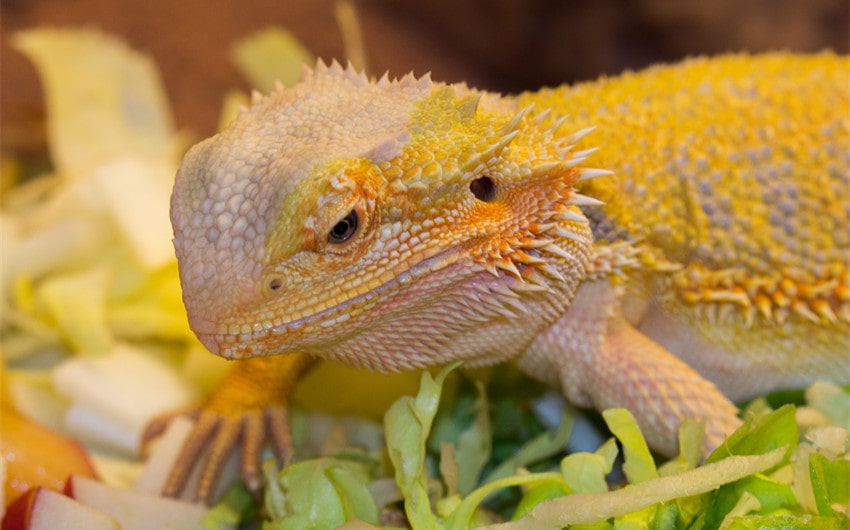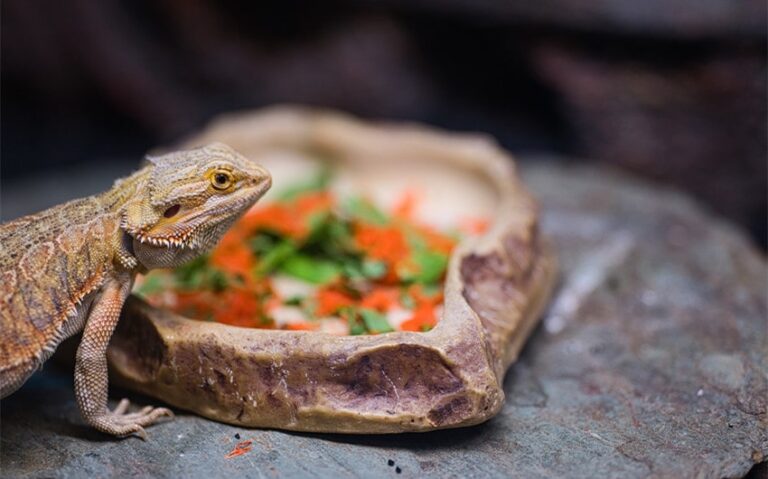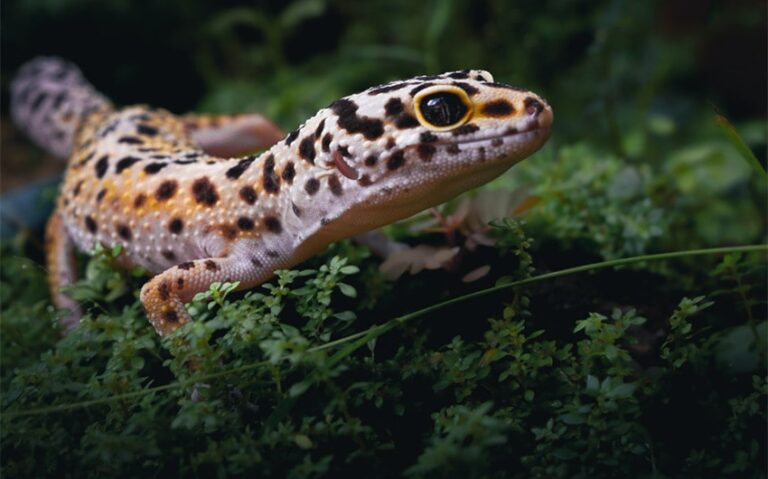15 Safe Veggies for Bearded Dragons to Keep Them Healthy
Feeding your bearded dragon a balanced and varied diet is essential to their health, and vegetables play a crucial role. But knowing which veggies for bearded dragons are safe and how to prepare them properly is key to avoiding potential health risks.
With the right mix of leafy greens, nutrient-rich vegetables, and proper preparation, you can ensure your bearded dragon gets the nutrition they need to thrive. In this article, we’ll explore the best vegetables to feed your bearded dragon, which ones to offer occasionally, and how to safely prepare and serve them.
Best Vegetables for Bearded Dragons
A well-balanced diet is crucial for the health and longevity of your bearded dragon. Vegetables, particularly leafy greens, should make up a significant portion of their daily intake, especially for adult dragons. Each vegetable provides specific nutritional benefits, including essential vitamins, minerals, and fiber that contribute to overall wellness. Below is a detailed look at the best vegetables for bearded dragons, focusing on their nutritional values.
1. Collard Greens
Collard greens are considered one of the best vegetables for bearded dragons due to their high calcium content and ideal calcium-to-phosphorus ratio. Calcium is essential for bone development and preventing Metabolic Bone Disease (MBD), a condition that results from calcium deficiency.
Nutritional Highlights:
-
- Calcium: High in calcium (approx. 232 mg per 100 g), vital for strong bones.
- Vitamin A: Contains beta-carotene, which converts to vitamin A, promoting healthy skin, vision, and immune function.
- Vitamin C: Supports immune health and aids in collagen production for skin and tissue maintenance.
- Fiber: Helps with digestion and maintaining a healthy gut.
2. Mustard Greens
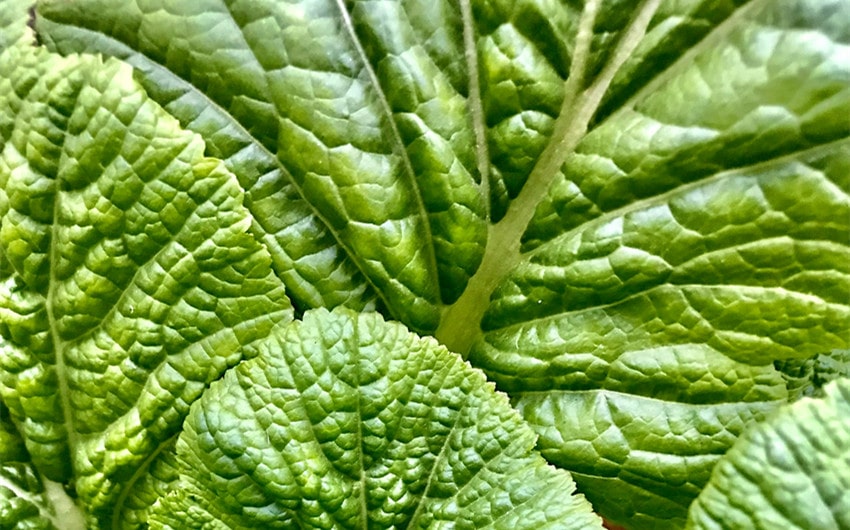
Mustard greens are another excellent choice for bearded dragons because they are packed with calcium and antioxidants, helping to strengthen the immune system and support bone health. Their slightly peppery taste can also provide variety in your dragon’s diet.
Nutritional Highlights:
-
- Calcium: High calcium content (115 mg per 100 g), crucial for bone development and health.
- Vitamin A: Rich in beta-carotene, essential for vision, skin health, and immune support.
- Antioxidants: Contains antioxidants like vitamin C and flavonoids, which protect cells from oxidative damage and support the immune system.
- Vitamin K: Plays a key role in blood clotting and bone metabolism.
3. Dandelion Greens
Dandelion greens are highly nutritious and safe for bearded dragons to consume on a regular basis. They are an excellent source of calcium, vitamins, and fiber, which promotes healthy bones and digestion.
Nutritional Highlights:
-
- Calcium: Provides a significant amount of calcium (187 mg per 100 g), supporting strong bones and preventing MBD.
- Vitamin A: Packed with beta-carotene, dandelion greens help maintain good vision and skin health.
- Vitamin C: Important for the immune system and tissue repair.
- Fiber: Helps regulate digestion and supports gut health.
4. Squash (Butternut, Acorn, etc.)
Squash, especially butternut and acorn varieties, are nutrient-dense and add a different texture to your bearded dragon’s diet. While they are lower in calcium than leafy greens, they are high in vitamins and fiber.
Nutritional Highlights:
-
- Vitamin A: High in beta-carotene (3500 mcg per 100 g in butternut squash), which supports eye health, skin, and immune function.
- Vitamin C: An excellent source of vitamin C, which promotes tissue repair and immune system health.
- Fiber: The fiber in squash aids digestion and helps prevent constipation.
5. Bell Peppers
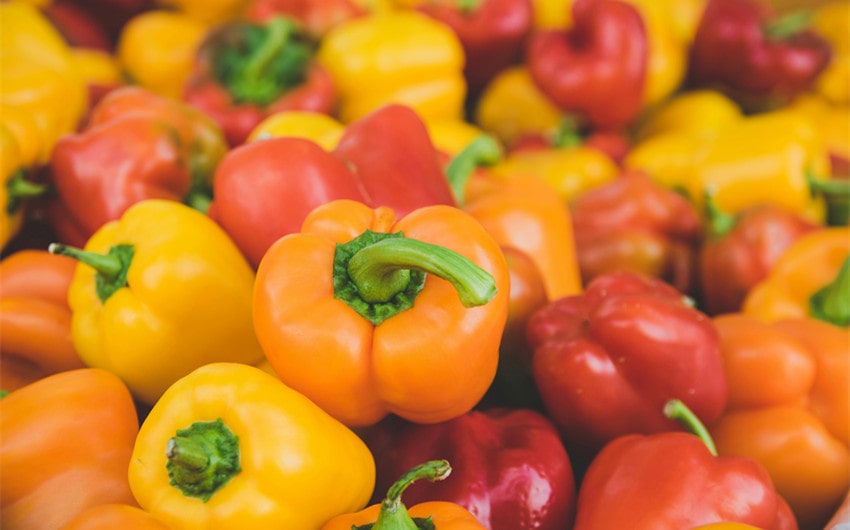
Bell peppers are a great addition to your bearded dragon’s diet due to their high water content and vibrant color, which attracts your pet’s attention. They also provide essential nutrients and antioxidants.
Nutritional Highlights:
-
- Vitamin C: Bell peppers are one of the richest sources of vitamin C (approx. 80 mg per 100 g), which helps with immune function and collagen production.
- Vitamin A: Contains beta-carotene, which supports vision and skin health.
- Hydration: With a water content of over 90%, bell peppers help with hydration, especially for dragons that may not drink enough water.
6. Turnip Greens
Turnip greens are an excellent source of calcium, fiber, and vitamins, making them a great option for daily feeding. Their calcium-to-phosphorus ratio is ideal for maintaining bone health and preventing metabolic bone disease.
Nutritional Highlights:
-
- Calcium: High calcium content (190 mg per 100 g), essential for bone development and health.
- Vitamin A: Contains beta-carotene, which supports healthy vision and immune function.
- Fiber: A good source of dietary fiber that helps maintain a healthy digestive system.
7. Carrots (in Moderation)

Carrots are a nutritious treat, but they should be fed in moderation due to their high levels of vitamin A. Carrots provide important nutrients like fiber and beta-carotene, but be cautious not to overfeed, as too much vitamin A can lead to toxicity, especially if your bearded dragon is also receiving supplements.
Nutritional Highlights:
-
- Vitamin A: Extremely high in beta-carotene (835 mcg per 100 g), which supports skin and eye health.
- Fiber: Provides digestive support and promotes regular bowel movements.
- Vitamin C: Supports immune function and tissue repair.
8. Endive
Endive is a hydrating, low-calorie leafy green that is safe for daily feeding. It is rich in vitamins and calcium while being low in oxalates, which allows for optimal calcium absorption.
Nutritional Highlights:
-
- Calcium: High in calcium (52 mg per 100 g), important for bone health.
- Vitamin A: Contains moderate amounts of beta-carotene for vision and skin support.
- Vitamin C: Helps boost immune function and promotes tissue repair.
- Water Content: High water content aids in hydration and digestion.
9. Escarole
Escarole is another nutrient-dense leafy green that is low in oxalates, making it ideal for regular feeding. It provides a good balance of vitamins and minerals and helps maintain hydration.
Nutritional Highlights:
-
- Calcium: Moderate calcium content (52 mg per 100 g), essential for bone health.
- Vitamin A: Contains beta-carotene, which aids in skin and eye health.
- Fiber: Supports healthy digestion.
- Low in Oxalates: Allows for proper calcium absorption without interference from oxalates.
Vegetables to Feed Occasionally
While bearded dragons thrive on a variety of vegetables, some should be fed occasionally rather than daily. These vegetables, though nutritious, contain certain compounds that can negatively impact your bearded dragon’s health if given in large quantities. These compounds include oxalates, goitrogens, and phosphorus, which can interfere with calcium absorption, thyroid function, and digestion. Below, we explore the most common vegetables that should be offered sparingly to your bearded dragon, along with the reasons for moderation.
1. Kale

Kale is often viewed as a superfood due to its high nutritional content, including vitamins A, C, and K, as well as calcium. However, it contains goitrogens, compounds that can interfere with thyroid function by inhibiting the uptake of iodine. While the goitrogenic effect in kale is lower compared to other goitrogen-rich foods, it’s still important to limit its intake to prevent potential thyroid issues in your bearded dragon.
Nutritional Highlights:
-
- Rich in calcium (254 mg per 100 g)
- High in vitamin A and vitamin C
- Contains moderate levels of goitrogens
When to Feed: Feed kale once a week or less to avoid potential thyroid-related issues while still reaping its nutritional benefits.
2. Spinach
Spinach is another nutrient-packed vegetable, rich in iron, calcium, and vitamins. However, it contains oxalates, which bind to calcium and prevent it from being absorbed properly. This can lead to calcium deficiency and increase the risk of metabolic bone disease (MBD) if fed too frequently.
Nutritional Highlights:
-
- High in vitamins A, C, and K
- Contains a significant amount of iron
- High in oxalates (which inhibit calcium absorption)
When to Feed: Spinach should be fed sparingly, no more than once every two weeks, to prevent oxalate-related calcium absorption issues.
3. Cabbage
Cabbage is a good source of fiber, vitamins, and minerals, but like kale, it contains goitrogens, which can interfere with thyroid function if consumed in large amounts. Additionally, cabbage can cause bloating or gas in some bearded dragons, which may lead to digestive discomfort.
Nutritional Highlights:
-
- Contains moderate levels of vitamin C and vitamin K
- High in fiber, which supports digestion
- Contains goitrogens, which may interfere with iodine uptake
When to Feed: It’s best to offer cabbage only occasionally, around once a week, to avoid any thyroid or digestive issues.
4. Broccoli

Broccoli is a nutrient-dense vegetable that provides a good amount of fiber, vitamin C, and vitamin K. However, like other cruciferous vegetables, broccoli contains goitrogens, which can disrupt the thyroid gland’s ability to function properly. Additionally, high levels of phosphorus relative to calcium in broccoli can affect the delicate calcium-to-phosphorus ratio required for your bearded dragon’s bone health.
Nutritional Highlights:
-
- Rich in vitamin C, fiber, and vitamin K
- Contains goitrogens that can impair thyroid function
- Moderate phosphorus content that can affect calcium absorption
When to Feed: Limit broccoli to once every two weeks or less, offering it as a part of a balanced veggie mix to ensure your bearded dragon benefits without risking thyroid issues or calcium imbalance.
5. Swiss Chard
Swiss chard, like spinach, is packed with nutrients, particularly vitamins A and C, but it also contains a high level of oxalates, which bind to calcium and reduce its absorption in the body. This can lead to calcium deficiency over time, making it important to limit the amount of Swiss chard in your bearded dragon’s diet.
Nutritional Highlights:
-
- High in vitamin A, vitamin C, and magnesium
- Contains fiber for digestive health
- Rich in oxalates, which inhibit calcium absorption
When to Feed: Swiss chard should only be offered occasionally, about once every two weeks, to prevent calcium-binding oxalates from causing long-term issues.
6. Bok Choy
Bok choy is a leafy green vegetable that offers a good amount of calcium and vitamins, but it contains moderate levels of goitrogens, which can affect thyroid function when consumed frequently. While it is lower in goitrogens compared to other cruciferous vegetables like cabbage or kale, it’s still best to offer bok choy in moderation.
Nutritional Highlights:
-
- Contains calcium and vitamins A, C, and K
- Moderate goitrogen content
- Low in oxalates, allowing better calcium absorption compared to other leafy greens
When to Feed: Feed bok choy occasionally, around once a week, to minimize potential thyroid disruption while still benefiting from its rich nutrient content.
Vegetables to Avoid
Not all vegetables are safe for bearded dragons, and some can even be harmful or toxic to their health. Certain vegetables contain compounds that can disrupt digestion, interfere with calcium absorption, or cause more severe health issues like toxicity or gastrointestinal problems. It’s important for bearded dragon owners to know which vegetables should be completely avoided to ensure their pet stays healthy. Below is a detailed guide on vegetables that should never be fed to your bearded dragon, along with explanations of the risks associated with them.
1. Rhubarb
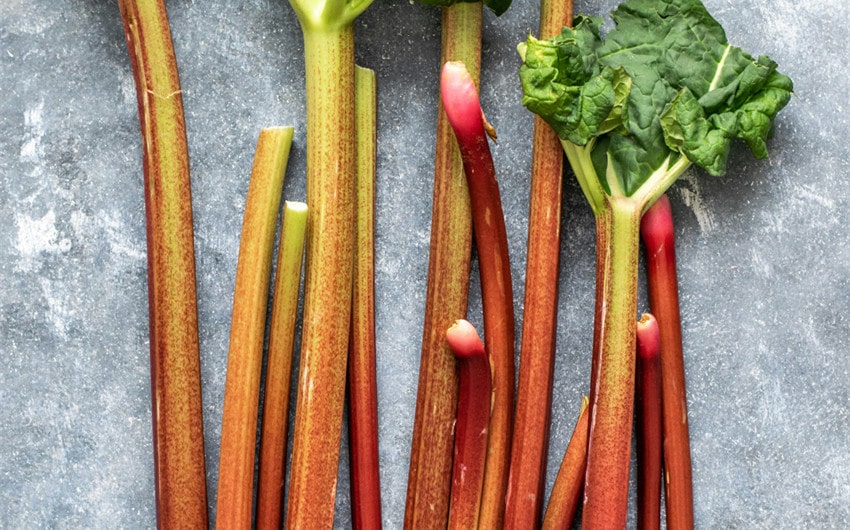
Rhubarb is highly toxic to bearded dragons and should never be fed to them under any circumstances. It contains oxalic acid in dangerously high levels, which can be fatal to reptiles if consumed. Oxalic acid binds to calcium in the body, preventing its absorption, which can lead to a life-threatening drop in calcium levels. This not only affects bone health but can cause acute toxicity.
Risks:
-
- High in oxalic acid, which prevents calcium absorption and can cause hypocalcemia (low blood calcium).
- Can cause immediate toxicity, leading to serious health issues, seizures, or even death.
2. Onions and Garlic
Onions and garlic, along with other plants from the Allium family, are harmful to bearded dragons due to their high levels of thiosulfates. These compounds can damage the red blood cells in reptiles, leading to hemolytic anemia (a condition where red blood cells are destroyed faster than the body can produce them). Symptoms of onion or garlic toxicity include weakness, lethargy, and loss of appetite.
Risks:
-
- Thiosulfates found in onions and garlic are toxic to bearded dragons, causing damage to their red blood cells.
- Can lead to hemolytic anemia, which results in severe lethargy, weakness, and potentially fatal complications.
3. Iceberg Lettuce
Iceberg lettuce is not toxic to bearded dragons, but it has very little nutritional value and is largely composed of water. While it may seem like a harmless choice, the high water content in iceberg lettuce can cause digestive issues such as diarrhea, which can lead to dehydration. Additionally, it lacks the vitamins and minerals that bearded dragons need, making it a poor dietary choice.
Risks:
-
- Extremely low in nutrients, providing little benefit to a bearded dragon’s diet.
- High water content can lead to diarrhea and dehydration.
4. Beet Greens
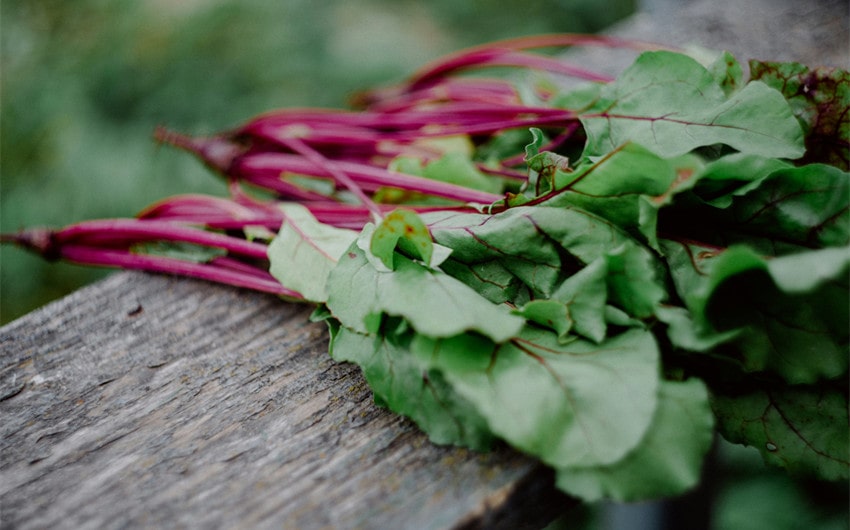
Beet greens, like spinach, are high in oxalates, making them unsuitable for regular feeding. The high oxalate content interferes with calcium absorption and can lead to calcium deficiency, which is especially dangerous for bearded dragons due to the risk of developing metabolic bone disease. While beet greens contain some beneficial nutrients, their oxalate content outweighs any potential benefits.
Risks:
-
- High levels of oxalates bind with calcium, leading to calcium deficiency over time.
- Can contribute to the development of metabolic bone disease, which weakens bones and muscles.
5. Tomatoes (in large quantities)
Tomatoes are not toxic, but they should be fed in very limited amounts due to their high acidity. Acidic foods can cause stomach irritation and digestive issues in bearded dragons. Additionally, the leaves, stems, and unripe parts of tomato plants contain solanine, a toxic substance that can harm reptiles.
Risks:
-
- High acidity can cause stomach irritation and digestive discomfort.
- Solanine in tomato plants is toxic and can cause poisoning if consumed.
6. Celery
Celery is not necessarily toxic, but like iceberg lettuce, it has very low nutritional value and is mostly composed of water. Celery’s high water content can lead to digestive issues such as diarrhea, which can result in dehydration. Additionally, it contains oxalates, which can interfere with calcium absorption.
Risks:
-
- Low in nutrients, offering little dietary benefit.
- High water content can lead to diarrhea and dehydration.
- Contains oxalates, which may contribute to calcium deficiency.
7. Avocado

Avocado is highly toxic to many animals, including reptiles like bearded dragons. It contains persin, a fungicidal toxin that can cause a range of serious health issues, including difficulty breathing, lethargy, and potentially death. Even small amounts of avocado can be harmful, so it should be strictly avoided.
Risks:
-
- Contains persin, a toxic compound that can cause severe illness in reptiles.
- Can lead to respiratory issues, lethargy, and death if consumed.
8. Potatoes
Potatoes, especially raw potatoes, should not be fed to bearded dragons due to their high starch content and the presence of solanine in the skin. Solanine is toxic to reptiles and can lead to digestive issues, neurological problems, and, in severe cases, death. Even cooked potatoes should be avoided because their starch content is difficult for bearded dragons to digest.
Risks:
-
- Solanine in raw potatoes is toxic and can cause poisoning in bearded dragons.
- High starch content can lead to digestive issues and may cause weight gain.
How to Prepare and Serve Vegetables
Proper preparation and serving of vegetables is crucial to ensure that your bearded dragon receives all the nutritional benefits without facing risks such as choking, digestive issues, or nutrient imbalances. Preparing vegetables the right way not only helps in digestion but also ensures that your bearded dragon enjoys a healthy, balanced diet that promotes long-term well-being. Below are key guidelines on how to safely prepare and serve vegetables for your bearded dragon, including washing, cutting, and mixing different vegetables.
1. Washing Vegetables Thoroughly
Before feeding any vegetables to your bearded dragon, it’s essential to wash them thoroughly. This helps remove dirt, pesticides, and other harmful chemicals that may be present on the surface of the vegetables. Even if you purchase organic produce, washing is necessary to ensure cleanliness and safety.
- Why It’s Important: Vegetables often contain pesticide residues and harmful bacteria that can cause digestive upset or illness in your bearded dragon. Washing under running water helps eliminate these contaminants and ensures the vegetables are safe for consumption.
- How to Wash: Use clean, cold water to rinse the vegetables thoroughly. For leafy greens, gently swish them in a bowl of water to remove any dirt or residues. You can also use a vegetable brush for tougher vegetables like carrots or squash to scrub away dirt. Avoid using soap or any chemical cleansers, as these can leave residues that are harmful to your bearded dragon.
2. Cutting and Chopping Vegetables
Bearded dragons can be prone to choking if the vegetables are not cut into appropriate sizes, especially if the pieces are too large or too tough for them to chew. Properly cutting or chopping vegetables into small, manageable pieces is vital for preventing choking hazards and ensuring easy digestion.
- For Leafy Greens: Leafy greens like collard greens, mustard greens, and dandelion greens should be chopped into bite-sized pieces. You can tear or chop them into strips, ensuring the pieces are small enough for your bearded dragon to grab easily with its mouth and chew without difficulty.
- For Harder Vegetables: Vegetables like carrots, bell peppers, and squash should be grated or finely chopped into small, soft pieces. Bearded dragons, especially younger ones, may have difficulty chewing hard vegetables, so cutting them into thin slices or shredding them with a grater is the best approach.
- For Soft Vegetables: Vegetables like zucchini or cucumber, which are naturally soft, can be sliced into thin rounds or strips. Their high water content makes them easier to eat, but be sure to avoid giving large chunks to prevent any risk of choking.
- For Baby Bearded Dragons: For younger or smaller bearded dragons, it’s crucial to cut vegetables even smaller—think of pieces that are no larger than the space between their eyes. This helps them manage their food without struggling or risking injury.
3. Serving Vegetables Fresh
It’s important to serve vegetables to your bearded dragon while they’re fresh and not wilted or spoiled. Fresh vegetables retain their full nutrient content, ensuring your pet gets the maximum benefit from their meal. Wilted or spoiled vegetables can cause digestive upset and lose much of their nutritional value.
- Why Freshness Matters: Fresh vegetables contain the highest levels of vitamins and minerals, providing the most nutritional benefit to your bearded dragon. Spoiled vegetables, on the other hand, can harbor bacteria and lead to digestive issues or illness.
- How to Ensure Freshness: Store vegetables properly in the refrigerator and discard any that show signs of wilting or spoilage. When preparing vegetables for your bearded dragon, cut them fresh just before serving to ensure they retain their nutritional integrity. If you have leftover chopped vegetables, store them in an airtight container in the fridge, but don’t store them for more than a day or two to avoid spoilage.
4. Raw vs. Cooked Vegetables
In general, most vegetables should be served raw to bearded dragons to preserve their full nutrient content. However, in certain cases, lightly cooking some vegetables may be beneficial, especially for those that are particularly tough or fibrous.
- Raw Vegetables: Most leafy greens, bell peppers, and squash can and should be served raw. Raw vegetables contain higher levels of nutrients like vitamin A, vitamin C, and calcium. The natural crunch of raw vegetables also stimulates your bearded dragon’s interest in the food and helps clean their teeth.
- Cooked Vegetables: For tougher vegetables like carrots or butternut squash, you may choose to lightly steam or boil them. Light cooking softens these vegetables, making them easier for your bearded dragon to chew and digest. However, avoid overcooking, as this can lead to a loss of key nutrients like vitamin C. Always allow the vegetables to cool completely before serving them to your dragon.
- Avoid Oils and Seasonings: Never add oils, seasonings, or other additives to the vegetables you’re preparing for your bearded dragon. They should be served plain, as oils, salt, and spices can be harmful to reptiles.
5. Mixing Different Vegetables
To ensure a balanced diet, it’s a good idea to mix different vegetables when serving them to your bearded dragon. A variety of vegetables provides a wide range of nutrients and encourages your dragon to eat a healthy, well-rounded meal. Different colors and textures can also stimulate their interest in the food.
- Balancing Calcium and Phosphorus: When mixing vegetables, aim to include a good balance of calcium-rich vegetables like collard greens, mustard greens, and dandelion greens. Avoid overloading the mix with vegetables that are high in oxalates or phosphorus, such as spinach or broccoli, as these can interfere with calcium absorption.
- Visual Appeal: Bearded dragons are attracted to colorful vegetables, so incorporating vibrant vegetables like bell peppers, squash, and carrots can make the meal more appealing. Variety is not only beneficial for nutrition but also keeps your bearded dragon interested in their food.
- Portion Sizes: Offer a small bowl of mixed vegetables each day, ensuring that the portion size is appropriate for the size and age of your bearded dragon. For adult dragons, vegetables should make up about 80% of their diet, while for younger dragons, the balance between vegetables and insects should be adjusted based on their growth stage.
6. Offering Vegetables at the Right Time
It’s a good idea to serve vegetables at specific times of the day when your bearded dragon is most active and likely to eat. Bearded dragons are diurnal, meaning they are active during the day, and they generally eat in the morning and early afternoon.
- Feeding in the Morning: Offer fresh vegetables in the morning when your bearded dragon is more likely to be hungry. By providing their food earlier in the day, you give them plenty of time to bask and digest their meal throughout the day.
- Removing Uneaten Vegetables: Be sure to remove any uneaten vegetables by the end of the day. Vegetables left in the enclosure for too long can wilt, spoil, or attract insects, which may cause health issues for your bearded dragon. Discard any leftovers and provide fresh food the next day.
7. Hydration Support Through Vegetables
Some vegetables, particularly those with high water content, like cucumbers and bell peppers, can provide additional hydration to your bearded dragon. Although your dragon should have access to fresh water at all times, vegetables with high water content can help supplement their hydration needs.
- Hydrating Vegetables: Vegetables like cucumbers, zucchini, and bell peppers can help keep your bearded dragon hydrated, especially if they are not drinking water as frequently as they should. However, be cautious not to rely solely on these vegetables for hydration, as they lack other vital nutrients.
- Balancing Hydration: While these hydrating vegetables can be beneficial, balance them with nutrient-dense options like collard greens and squash to ensure your bearded dragon gets the vitamins and minerals they need alongside hydration.

